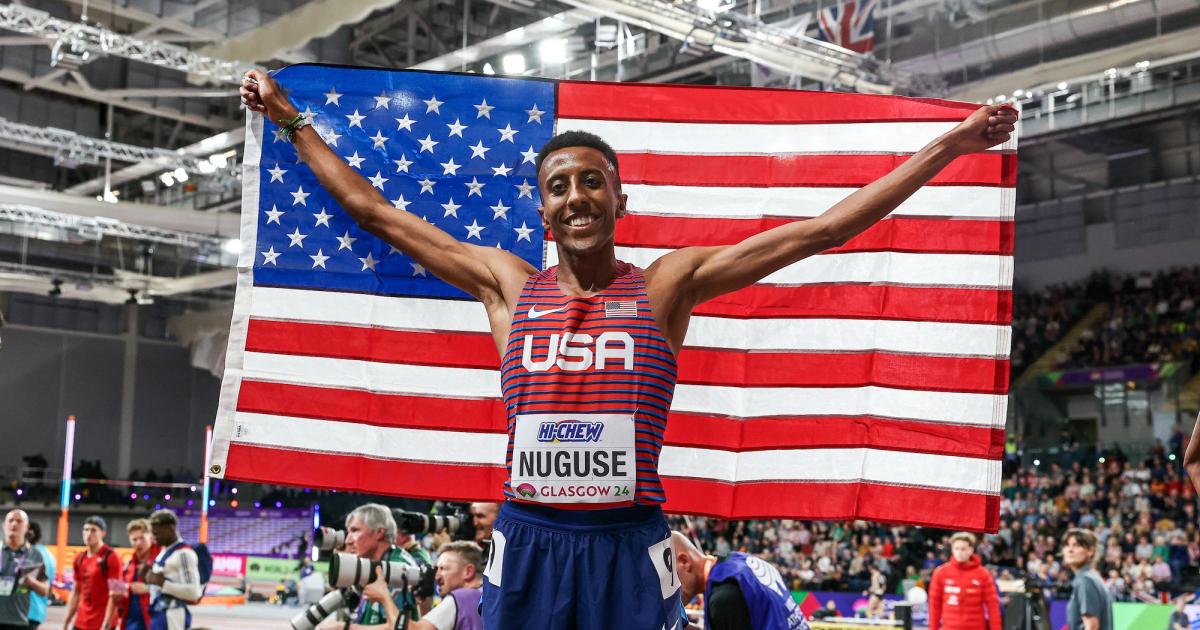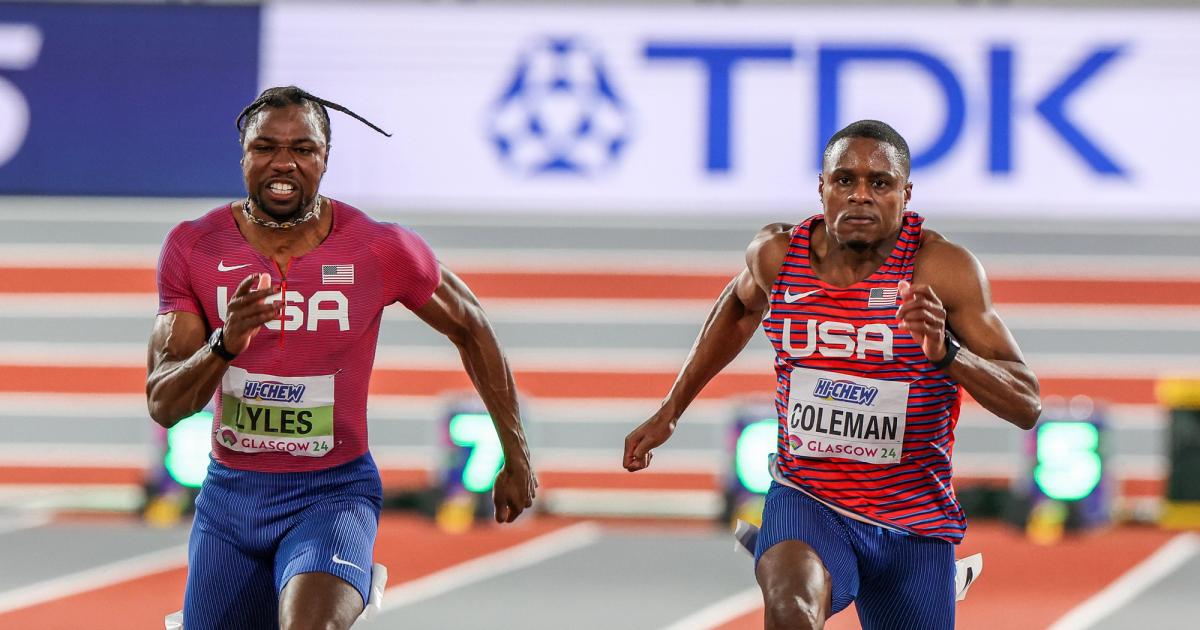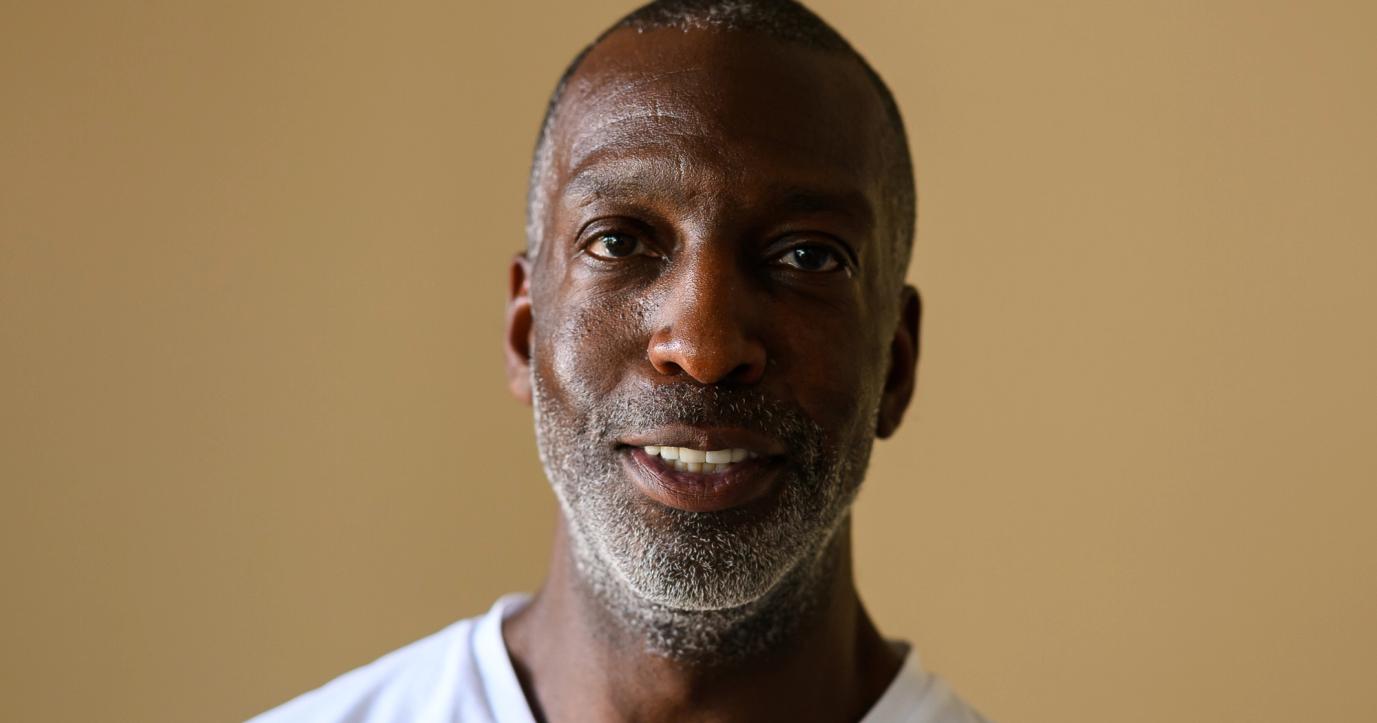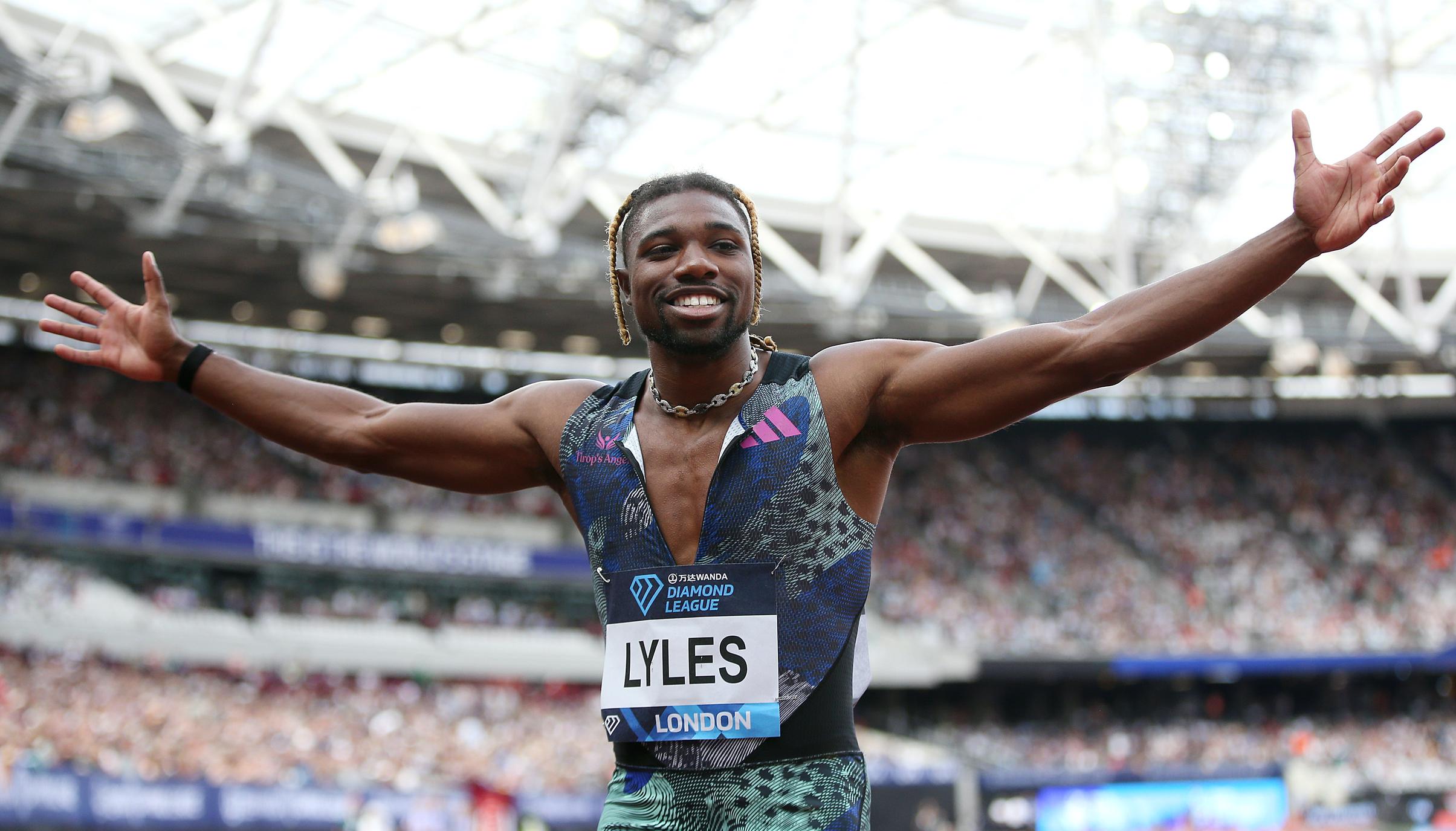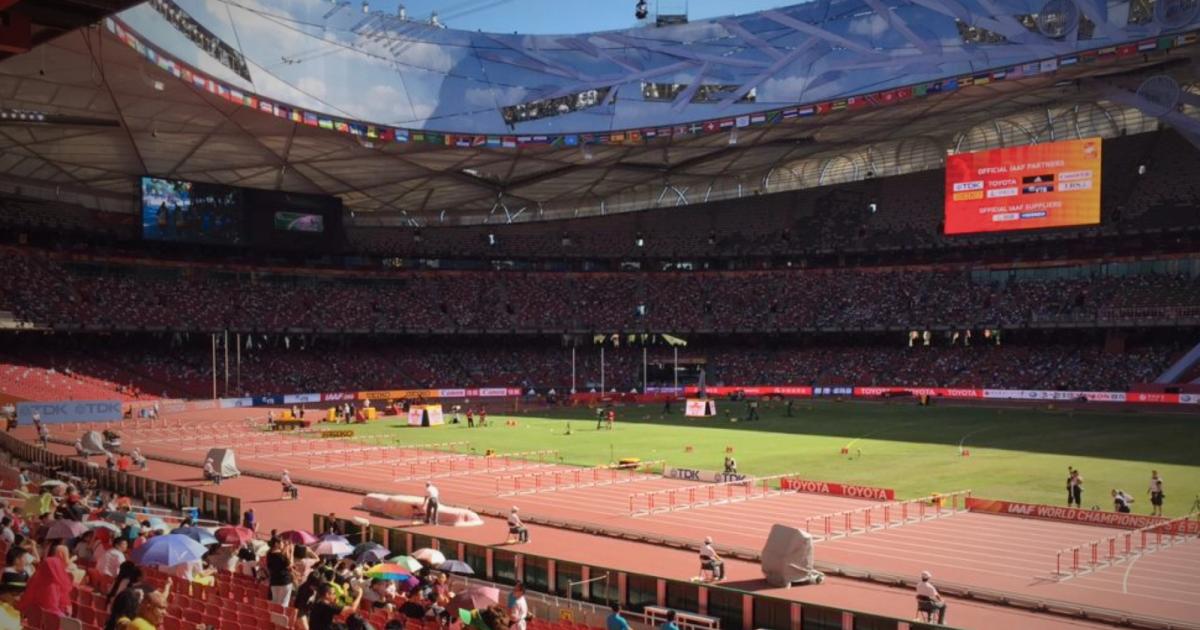By David Melly
March 4, 2024
Props to the people of Glasgow: the 2024 World Athletics Indoor Championship did not disappoint. From start to finish, the three-day meet delivered an electric atmosphere and fantastic performances, showing that the good ol’ fashioned combination of rabbit-free championship racing, a packed but intimate stadium, and the sport’s biggest stars is a special sauce that always delivers a delicious meal.
If you’re a fan of U.S. athletics, it was quite the weekend to celebrate as Team USA ran the table with 20 medals – six of them gold. Three of those six golds went to first-time World champions, and one of the most decorated athletes in the entire sport, shot putter Ryan Crouser, finally won the single title that’s evaded him throughout his long and decorated career. If you like rooting for the underdog, there was plenty to celebrate as well, as athletes from countries like Dominica, St. Lucia, and Burkina Faso picked up their nations’ first World Indoor titles, and stalwarts of the international racing scene like Noelie Yarigoand Zaynab Dosso had the kind of heartwarming breakouts they make movies about.
Below, we break down the biggest winners and losers of the weekend and offer our analysis, reflections, and takeaways from the end (for pros) of the indoor season. If you want to listen to or watch our daily recaps by Anderson Emerole in Glasgow, you can find those on Apple Podcasts, Spotify or YouTube.
Full results can be found here.
Winner: Fans of sprint rivalries
For the second time this winter, the Noah Lyles-Christian Coleman rivalry lived up to the hype and then some. The U.S. champ and the former World champ were locked in from the start of the competition, each winning his respective 60m heat and semifinal comfortably before a big rematch in the final with a global title on the line. Throughout the rounds, close observers noted that Coleman’s start looked better than ever, and despite his recent loss to Lyles in Albuquerque, the top form he was showing seemed to make him the favorite for gold. And he delivered via a 6.41 victory to Lyles’s silver-medal 6.44, picking up his third straight medal (second gold) and solidifying the argument that Coleman is the greatest 60-meter runner of all time. Both men were great sports with a lot of praise for the other in the mixed zone, and it’s safe to say that following their friendly rivalry has made this indoor season particularly thrilling.
In the women’s 60m, American fans were robbed of the chance to cheer on Aleia Hobbs as she limped away from her semifinal and withdrew from the competition shortly before the final with what appeared to be a calf injury. Sadly, the U.S. champ has battled persistent injuries over the years that have made it hard for her to deliver on the promise of her generational talent.
But we still got a brilliant showdown between pre-race favorite Julien Alfred of St. Lucia and Polish Internet sensation Ewa Swoboda, the latter of whom clocked a lifetime-best 6.98 in the semifinal and came back a few hours later to win silver behind Alfred with a well-timed 6.98 of her own. A former Texas Longhorn, Alfred was still in the NCAA ranks this time last year and it will be exciting to see what she can do later this summer with all her focus on an Olympic medal.
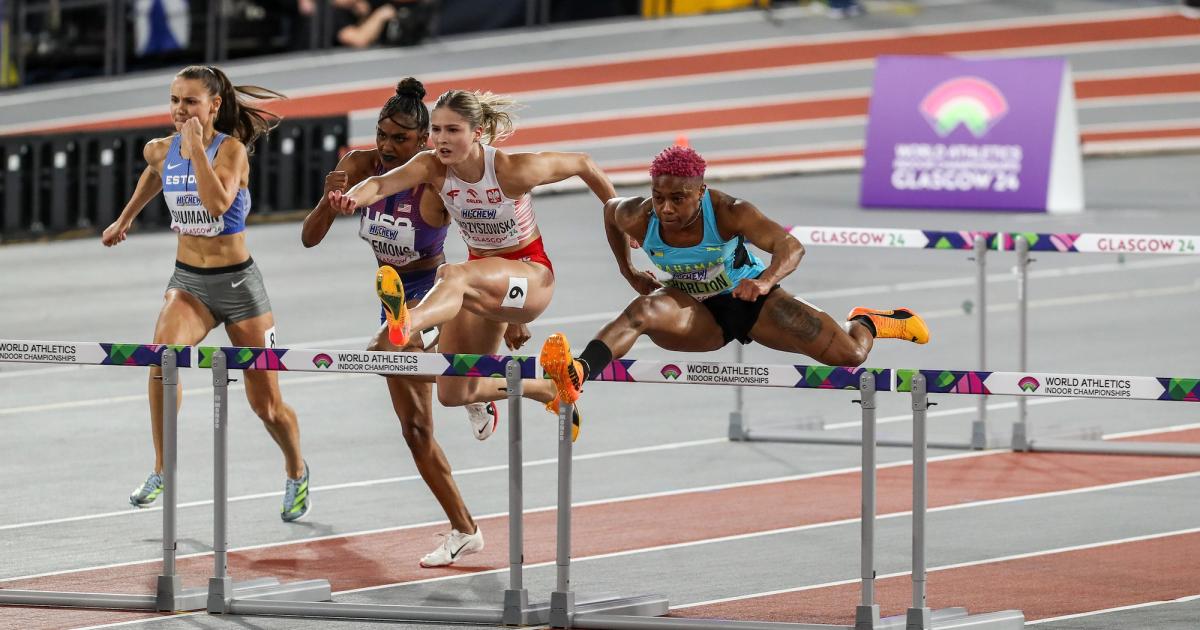
Kevin Morris/@KevMoFoto
Bahamian Devynne Charlton stormed to gold and broke her own 60m hurdles world record. (Kevin Morris/@KevMoFoto)
Loser: Fans of hurdles rivalries
Hurdles fans were still treated to some incredible performances, but neither the men’s nor the women’s 60m hurdles final was, ultimately, that closely contested. On the men’s side, repeat champ Grant Holloway is quite simply too good. He has a winning streak in the event that stretches back nearly a decade to his high school days. Holloway’s margin of victory in his 7.29 winning performance was by far the largest of the four 60-meter events – in fact, his gap (0.14 seconds) was as large as the other three combined (0.03 seconds in the men’s 60m, 0.02 seconds in the women’s, and 0.09 sec in the women’s 60m hurdles).
On the women’s side, the news that U.S. champ Tia Jones wasn’t making the trip to Scotland was a disappointment to fans hoping to see her match up with Bahamian Devynne Charlton. Jones was out due to injury. And in the semifinal, Dutchwoman Nadine Visser, one of the few women who could possibly challenge Charlton, clattered the first hurdle and didn’t advance. But just because Charlton was the heavy favorite doesn’t mean she coasted to victory – she still threw down a 7.65 in the final to improve her own world record.
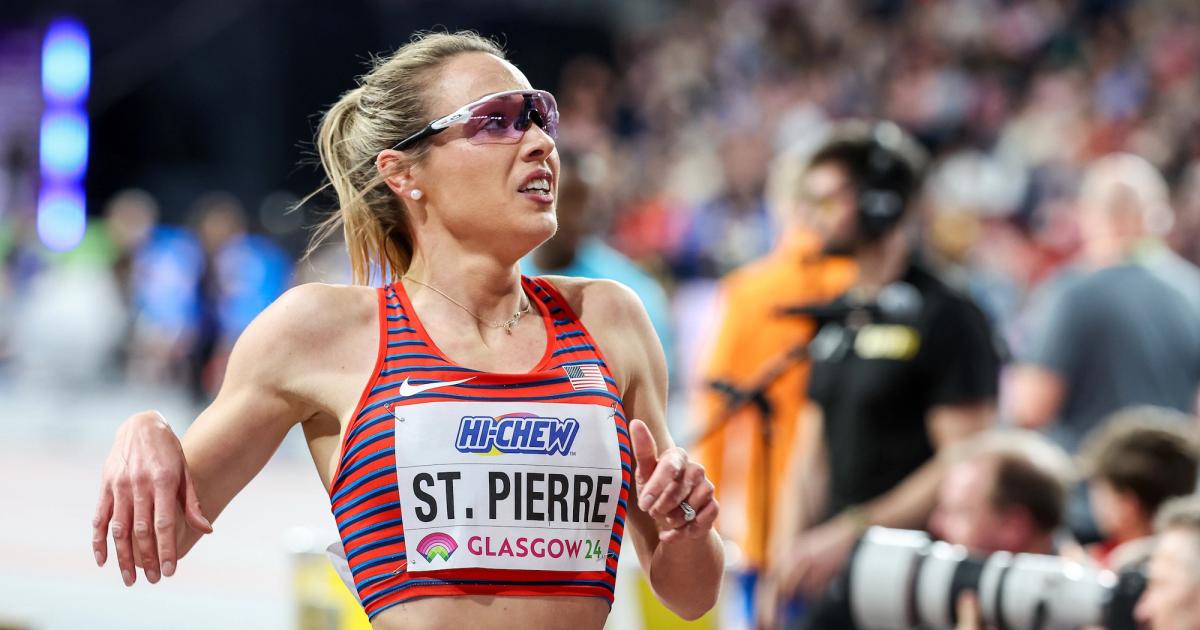
Kevin Morris/@KevMoFoto
Elle St. Pierre kicked down 5000m world record holder Gudaf Tsegay to become the first American woman to win the World Indoor 3000m title.
Winner: Moms everywhere
Two days before her son Ivan turned one year old, U.S. champ Elle St. Pierre toed the line in the 3000m final facing a formidable opponent – 3x world champ and 5000m world record holder Gudaf Tsegay. Conventional wisdom was that while St. Pierre, Australian Jessica Hull, and Brit Laura Muir all had strong chances at a silver medal, no one was touching Tsegay, the world record holder at 1500m indoors coming off a 8:17.11 performance three weeks earlier. During the middle laps, it looked like we were building toward another Tsegay title as she took the lead and squeezed the pace down… but as the seconds ticked by, she couldn’t quite seem to fully drop St. Pierre or Kenyan steeplechase specialist Beatrice Chepkoech. At the bell, all three were kicking hard but St. Pierre looked the best of the trio, and with one last decisive move on the final turn, the Vermont native blazed past her rival to an 8:20.87 winning time, earning the gold medal and an American record.
It was easily the biggest win of St. Pierre’s illustrious career to date, and it certainly raises the prospect of an Olympic medal of any color being within reach with a few more months of healthy postpartum training.
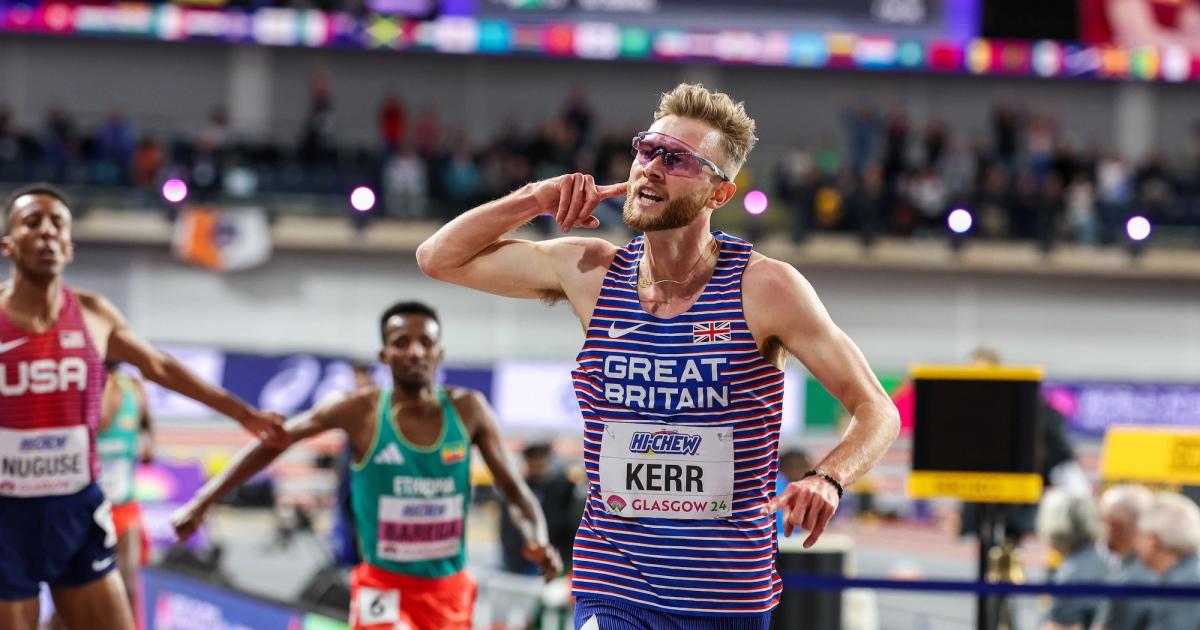
Kevin Morris/@KevMoFoto
Josh Kerr got the home crowd going with his win in the men’s 3000m for the second world title of his career. (Kevin Morris/@KevMoFoto)
Loser: Jakob Ingebrigtsen’s gold-medal chances
As the reigning Olympic champ recovers from an Achilles injury and passes time by chatting with the Norwegian press, one of his biggest rivals put on a thrilling hometown show. Seattle-based Scot Josh Kerr decided fairly late in the season to compete at World Indoors, and it turned out to be a great choice: he delivered Great Britain’s sole track gold of the weekend in the men’s 3000m in front of a roaring crowd, thanks to a well-timed kick over Ethiopian Selemon Barega and a 25.19 final 200m. The winning time was a relatively pedestrian 7:42.98, but between this performance and his world-record two mile at the Millrose Games, Kerr has shown that he is coming into 2024 with both strength and speed. If he can maintain the form he’s in this winter, Ingebrigtsen – or anyone else – is going to have their hands full in the Paris 1500m final.
American record holder Yared Nuguse picked up the silver medal thanks to a fast last lap of his own and a well-timed lean at the line, his first time on the podium in a global championship. If he can figure out how to be right in the pocket of the leader at the end of races the way Kerr always seems to be, Nuguse should be a strong Olympic contender as well.
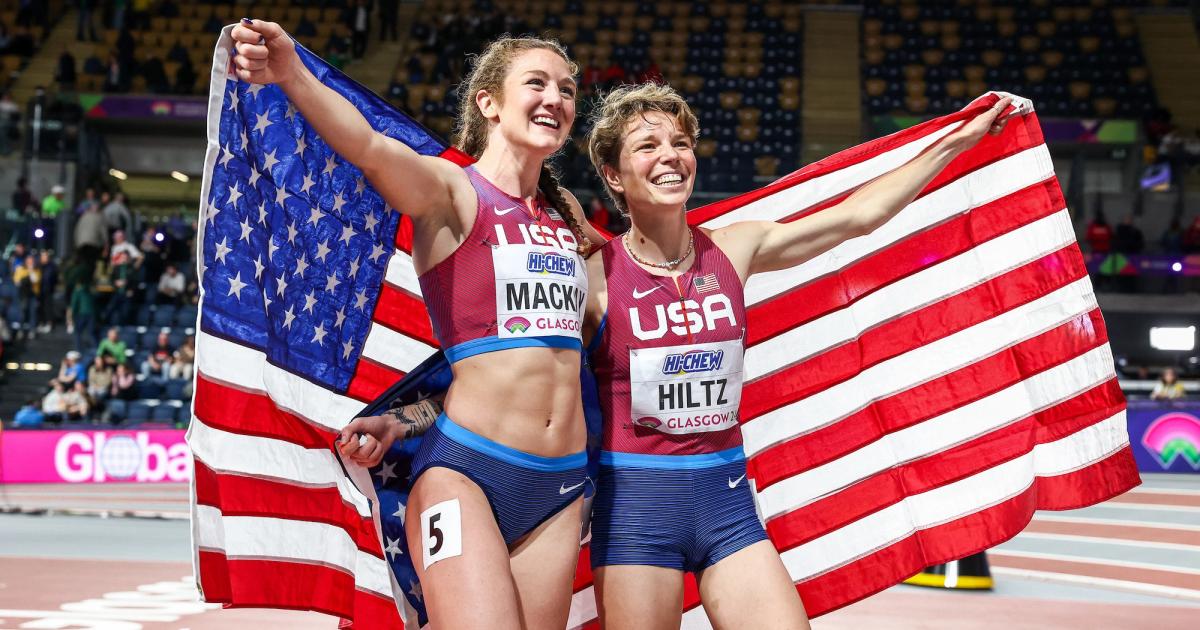
Kevin Morris/@KevMoFoto
Emily Mackay and Nikki Hiltz were two of four medals the United States earned in the 1500m in Glasgow. (Kevin Morris/@KevMoFoto)
Winner: American middle-distance fans
If someone told you that one country would pick up 7 medals across 800m, 1500m, and 3000m this weekend, even the most optimistic of American track fans would probably not have guessed that it was the U.S., not Ethiopia, that claimed such a large haul. But Team USA’s middle-distance contingent delivered hugely at every possible turn this weekend, earning two golds (men’s 800m and women’s 3000m), three silvers (men’s and women’s 1500m and men’s 3000m), and two bronzes (men’s and women’s 1500m), more than every other nation combined in those events.
It’s hard to fathom how the team could’ve done any better: one could argue that Cole Hocker and Yared Nuguse could possibly have won their respective events, but in practice they both executed superb races and the performances that beat them were simply on another level. The biggest disappointment was neither U.S. athlete in the women’s 800m making the final, but given that it took a 1:59.65 run to qualify (a time only U.S. woman has run this year, and she’s still in the NCAA) it’s understandable. Runners who’d been to global championships before – Bryce Hoppel, Elle St. Pierre, Nikki Hiltz, Nuguse, and Hocker – notched their best performances yet, and first-timers like Emily MacKay, Olin Hacker, and Hobbs Kessler (road champs notwithstanding) all nailed their debuts.
Loser: Ethiopian middle-distance fans
It wasn’t a terrible weekend for the Ethiopian athletics contingent, as they brought home World titles in the women’s 800m and 1500m and medaled in 4 of the 6 events they contested, but it certainly was an underperformance from the team that won 9 medals in 2022 and went 0 for 3 with reigning champions trying to pick up a second gold. Two of the current world leaders underperformed as Habitam Alemu’s championship woes continued in the 800m and Selemon Barega got double-outkicked in the 3000m. With all the chaos, it was almost a surprise to see 1500m world leader Freweyni Hailu track down Emily MacKay over the final 400m and take the gold – something that seemed like a no-brainer a week ago.
Fans looking for a silver lining will certainly be cheering 23-year-old Tsige Duguma’s arrival on the world stage, however. Duguma sure made the most of her first global championship appearance, getting a new PB of 1:58.35 in the semifinal and negative-splitting 63.39-58.51 in a tactical final to take gold in 2:01.90. She’ll be one to watch in the coming outdoor season.
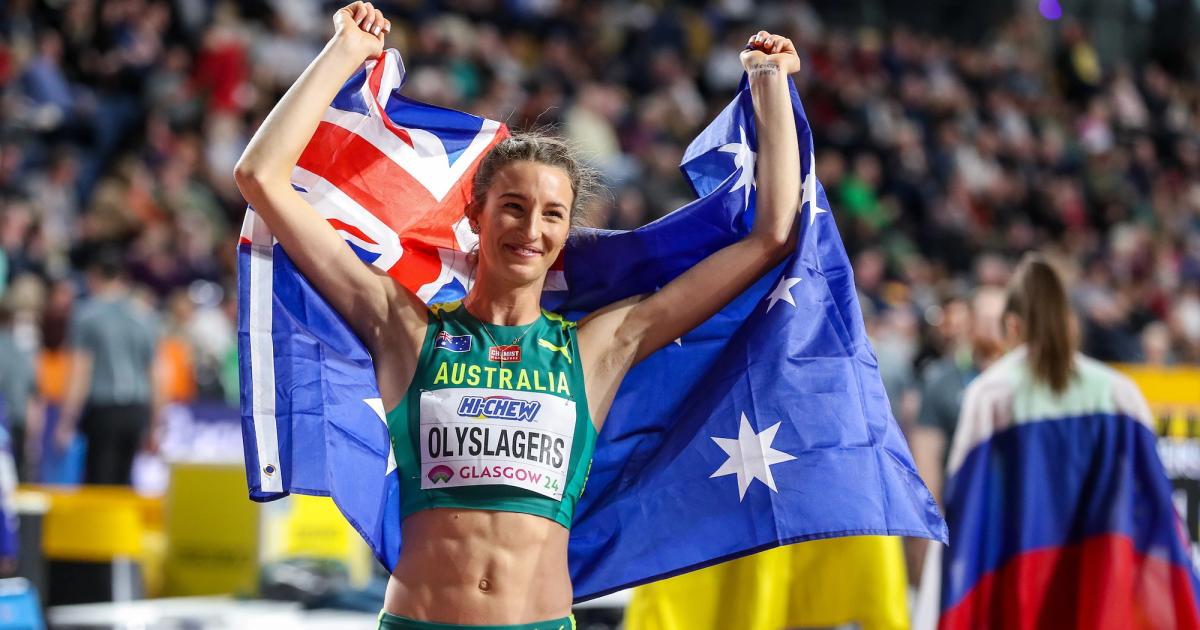
Kevin Morris/@KevMoFoto
Australia’s Nicola Olyslagers finally got her gold medal in the women’s high jump. (Kevin Morris/@KevMoFoto)
Winner: First-time jumps champions
Each of the four victors in the women’s jumping events had something in common: they had never won a global gold before. In the high jump, Australian Nicola Olyslagers has had a couple of close calls, with a bronze medal in Budapest 2023 and a silver at the Tokyo Olympics, but this was her first time on top of the podium thanks to a 1.99m clearance 2cm above rival Yaroslava Mahuchikh. In the triple jump, Thea LaFond of Dominica won her nation’s first gold medal with the best jump of her life, breaking the 15-meter barrier by one centimeter on her second attempt to defeat Cuban Leyanis Perez Hernandez.
As the current world leader, American fan favorite Tara Davis-Woodhall entered the competition expected to contend for the win, but it was still a treat to see her deliver with a 7.07m leap – and a bonus for Team USA that her teammate, Monae’ Nichols, picked up the silver right behind her. But the biggest cheers in the field events of the weekend were for 23-year-old Molly Caudery, the British vaulter who cleared 4.80m on her second attempt to defeat a stacked field that included World/Olympic champ Katie Moon, former World/Olympic champ Katerina Stefanidi, and two-time World Indoor champ Sandi Morris.
Loser: Repeat jumps champions
It’s hard to call a World champion who picks up another title a “loser,” but at least two gold medalists in Glasgow were pretty visibly frustrated both on and off the runway. In the men’s long jump, Miltiadis Tentoglou won a squeaker of a competition over Italian Mattia Furlani, as both men leapt 8.22m on their first attempt then Tentoglou won the “best second attempt” tiebreaker with leaps of 8.15m and 8.19m in his third and sixth rounds. Tentoglou now holds the rare trifecta of being the reigning Olympic, World outdoor, and World indoor title all at the same time – which makes it all the more understandable that he was vocally frustrated with the World Athletics announcement that they are considering piloting a new long jump format without consulting him or seemingly any other active athletes first.
In the men’s pole vault, world record holder Mondo Duplantis notched his fifth straight global title, a streak going back to the Tokyo Olympics, but it didn’t come easy. Duplantis looked uncharacteristically uncomfortable in the pit all night, and he came quite close to finishing 5th before clearing 5.85m on his final attempt to stay in the competition. A few heights later, he bounced back to a second-try clearance at 5.95m and another successful third attempt at 6.05m to set a new world lead, but it was quite unusual to see the Louisiana-born Swede look so rattled. In the end, Duplantis actually missed 8 of the 12 attempts he took, an unusual sequence for any elite vaulter, let alone the event’s GOAT. I don’t know enough about the technical side of pole vault to offer an informed opinion, but I will share that Becca “polevaultpower” Peter, one of the leading Twitter voices in the event, has been a vocal critic of the use of automatic standards (the metal contraptions holding the bar up) in global championships and voiced concerns that the issues they create may have contributed to French vaulter Margot Chevrier’s scary injury in the women’s competition.
Winner: Femke Bol and her teammates
The 400m sprint is a famously grueling event. Anyone who’s watched a high school track meet has likely seen a 400-meter runner’s legs turn to jelly in the final straightaway and seen the toll that maintaining an all-out effort all the way around the track can take after the finish line. But Dutch sprinter Femke Bol is no stranger to a heavy workload, and she ran five(!) 400-meter races in three days this weekend: three rounds of the open 400m and two of the 4x400m. She was rewarded for her efforts with two gold medals, and it’s not every day you get to see a country like the Netherlands (population: 17.5 million) take on a sprint powerhouse like the United States and come out on top. But thanks to Bol’s relay heroics – and the benefit of having silver medalist in the open 400m Lieke Klaver come back for the 4x400m final – the Dutch women picked up the win and improved on their silver medal from 2022.
In the end, the Dutch team left the competition with 5 medals (2 gold, 1 silver, and 2 bronze), the second-most medals of any nation in the competition behind the U.S.’s incredible 20-medal haul.
Loser: The limits of 4x400m relay spots
Team USA’s decision to run sprinter Noah Lyles on the 4x400m final was controversial, to say the least. Lyles, a short sprinter by trade who’s very publicly spent the season working on his start, has also expressed an interest in running both the 4x100m and 4x400m at the Paris Olympics and successfully lobbied for something of an audition this weekend, when he was placed on the third leg of the men’s relay for the final. Ultimately, he comported himself just fine, delivering a 45.68 split more or less in line with the other relay runners and handing off the baton in the lead. Belgian Alexander Doom’s kick was ultimately too much for anchor leg Chris Bailey, but the U.S. team still picked up a silver medal in a respectable 3:02.60.
The reason why this falls in the “loser” category is because, unfortunately, relay spots are a zero-sum game. For Lyles to be added to the roster, someone else had to be kicked off, in this case, Trevor Bassitt and Paul Dedewo. There’s no way to know for sure if subbing in one or the other would’ve had a better or worse outcome, but it’s still a bit sad to see the runners performing the unglamorous task of getting their team to the final watching the fruits of their labor from the sidelines.
Winner: Peacock subscribers
Okay, let’s first start with the positive. The whole championships were streamed live (with a subscription) in relatively tight, compact three-hour windows that did a great job balancing both track and field action when possible. The shorter format of the indoor championship compared to its 9-day outdoor counterpart meant that there was always finals action happening and medals being decided, and with Olympic-level stars like Lyles, Duplantis, Bol, and Crouser competing, it didn’t feel like World Indoors was a “watered down” affair.
British middle-distance vet Hannah England has been a particularly welcome addition to the broadcast booth over the past season or two, and while Dutch sprinter Dafne Schippers appeared to be finding her footing live on the air at times, it’s always great to hear new voices with plenty of expert analysis to offer.
Loser: TV watchers
Despite the quality sports entertainment package promised by World Indoors, the programming overlords at NBC Universal couldn’t quite bring themselves to carve out a few slots in the TV schedule to show the meet live on the tube. The only time the meet was shown on television was the Sunday afternoon session on CNBC, which meant that thrilling events like the men’s 60m final, the men’s and women’s 3000m, and 8 of the 10 field event finals were relegated to online-only status. And it’s not like track and field was bumped by more popular live events – the NBC, CNBC, and USA schedule for the weekend was populated largely by Shark Tank spinoffs, alpine skiing, and Law and Order marathons.
To add insult to injury, the CNBC broadcast aired “live” footage of a few sprint finals at the top of its program with no replay disclaimer, as if to trick the viewer into thinking Grant Holloway was hurdling for the second day in a row. If the most prominent names in the sport are going to toe the line and race hard in March, they deserve the biggest platform possible to compete on – and with NBC’s precious Olympic coverage on the horizon, it should be a win-win to use this opportunity to start building a year-long narrative around the top athletes to watch. Track and field athletes and fans alike deserve better.

David Melly
David began contributing to CITIUS in 2018, and quickly cemented himself as an integral part of the team thanks to his quick wit, hot takes, undying love for the sport and willingness to get yelled at online.
